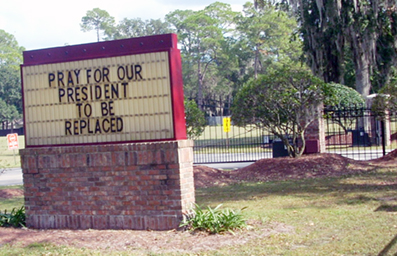
An FFRF member sent this photo taken on Oct. 22 at the First Conservative Baptist Church in Jacksonville, Fla., as an example of church electioneering. There was also a Romney for president sign and one that said, “If you want to keep your job, pray the president loses his job.”
The Freedom From Religion Found-ation has filed a historic challenge by suing the Internal Revenue Service over its failure to enforce electioneering restrictions against churches and religious organizations.
Calling the lack of enforcement a violation of the Establishment Clause of the First Amendment and of FFRF’s equal protection rights, the state/church watchdog filed the lawsuit Nov. 14 in U.S. District Court for the Western District of Wisconsin.
A widely circulated Bloomberg News article quoted Russell Renwicks of the IRS Tax-Exempt and Government Entities division, saying the agency has suspended tax audits of churches. Although an IRS spokesman claimed Renwicks “misspoke,” there appears to be no evidence of IRS inquiries or enforcement action in the past three years.
Other news sources, such as The Associated Press, claim the IRS hasn’t been auditing churches since 2009.
FFRF is asking the federal court to enjoin the IRS commissioner from continuing “a policy of non-enforcement of the electioneering restrictions against churches and religious organizations.”
Additionally, FFRF seeks to order the IRS “to authorize a high-ranking official within the IRS to approve and initiate enforcement of the restrictions of §501(c)(3) against churches and religious organizations, including the electioneering restrictions, as required by law.”
As many as 1,500 clergy reportedly took part in a mass violation of the electioneering restrictions on Sunday, Oct. 7, notes the legal complaint, which also references “blatantly political” full-page ads by the Billy Graham Evangelical Association running on the three Sundays leading up to the Nov. 6 election.
“[I]n recent years, churches and religious organizations have been blatantly and deliberately flaunting the electioneering restrictions of §501(c)(3),” the complaint asserts.
FFRF has more than 19,000 members nationwide “who are opposed to government preferences and favoritism toward religion.” FFRF is a tax-exempt organization that “must and does abide by the electioneering restrictions of §501(c)3.” FFRF is regularly contacted by its members and members of the public over specific and general violations of church electioneering restrictions, and FFRF staff attorneys regularly ask the IRS to investigate such violations.
This non-enforcement “constitutes preferential treatment to churches and religious organizations that is not provided to other tax-exempt organizations, including FFRF,” the complaint notes. “Churches and religious organizations obtain a significant benefit as a result of being non-exempt from income taxation, while also being able to preferentially engage in electioneering, which is something secular tax-exempt organizations cannot do.”
This preferential tax exemption involves more than $100 billion annually in tax-free contributions to churches and religious organizations in the United States.
Website swamped
After news of the lawsuit became the No. 1 item on Reddit, an online social network, almost 70,000 people flooded FFRF’s website to read about the case. Unfortunately, the spike took down the site intermittently.
Attorney Richard L. Bolton, the litigator, who is with Boardman Law Firm in Madison, Wis., and has been working with FFRF for more than a decade, reported receiving almost 100 adulatory emails from strangers around the world, thanking him for his role in the case. Bolton said this is unprecedented in his experience as an attorney.
Biologist Jerry Coyne of the University of Chicago, author of Why Evolution Is True, wrote in his November blog, “We now get revenge: the FFRF sues the IRS for failure to enforce tax laws on churches,” adding that he considers FFRF “the most effective secular organization in the U.S. That’s largely because instead of hosting endless ineffectual meetings with the same speakers, or navel-gazing about internal divisiveness, the FFRF actually does something: through scrupulous monitoring of the government and judiciously filing lawsuits, the FFRF fights an endless battle against the brushfires of religious enthusiasm that threaten to incinerate our Constitution.”
Thanks to Coyne’s blog, which pitched membership, Reddit’s notice and other news stories, many new supporters have found and joined FFRF.
In addition to reporting the Graham ministry’s electioneering to the IRS, FFRF has sent more than 27 letters of complaint to the IRS involving other such violations so far this year. Recent complaints include:
• Green Bay Bishop David Ricken, who wrote an article on diocesan letterhead inserted in all parish bulletins about voting and choosing the president and other offices. Ricken warned that if Catholics vote for a party or candidate who supports abortion rights or marriage equality, “you could be morally ‘complicit’ with these choices which are intrinsically evil. This could put your own soul in jeopardy.”
• Peoria Bishop Daniel Jenky, who, in an April homily, sharply criticized President Barack Obama, saying Obama was “following a similar path” as Hitler and Stalin. Jenky said “every practicing Catholic must vote, and must vote their Catholic consciences.”
• Madison Bishop Robert Morlino, who wrote a Nov. 1 article, “Official guidelines for forming a Catholic conscience in the Diocese of Madison,” published in the Catholic Herald, spelling out “non-negotiable” political areas. “No Catholic may, in good conscience, vote for ‘pro-choice’ candidates [or] … for candidates who promote ‘same-sex marriage.’ ”
• A church marquee saying “Vote for the Mormon, not the Muslim! The capitalist, not the communist!” in front of the Church in the Valley in Leakey, Texas.
The federal lawsuit is FFRF v. IRS, (12-cv-818). The case is before U.S. District Judge William M. Conley. Tax-deductible donations to FFRF’s Legal Fund are gratefully accepted. Read the complaint, hyperlinked in FFRF’s news release, by scrolling to Nov. 14, 2012:
ffrf.org/news/news-releases/

